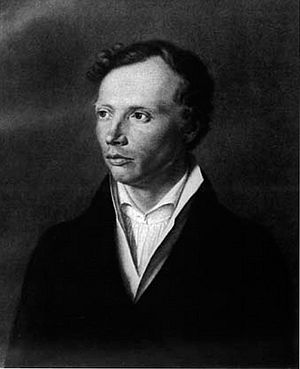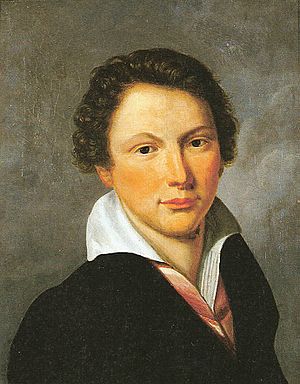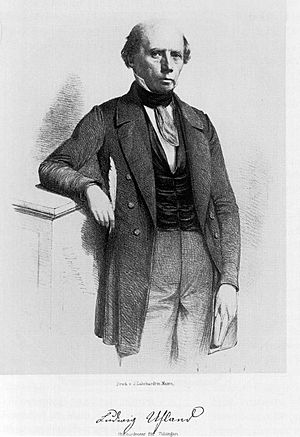Ludwig Uhland facts for kids
Johann Ludwig Uhland (born April 26, 1787, died November 13, 1862) was a German poet. He also studied languages and literature, making him a philologist. He was known for his work as a literary historian, too.
Contents
Discovering Ludwig Uhland's Life
Ludwig Uhland was born in Tübingen, a town in Württemberg, Germany. He went to university there to study law. But he was also very interested in old stories and poems from the Middle Ages. He especially liked old German and French poetry.
After finishing his law studies in 1810, he traveled to Paris. He stayed there for eight months to learn more about poetry. From 1812 to 1814, he worked as a lawyer in Stuttgart. He was part of the office for the minister of justice.
Uhland's Journey as a Poet
Uhland started writing poems in 1807 and 1808. He wrote ballads and songs for a magazine called Musenalmanach. Later, in 1812 and 1813, he wrote more poems for other collections.
In 1815, he gathered his poems into a book. It was called Vaterländische Gedichte, which means "Patriotic Poems." This book quickly became very popular. He kept adding new poems to almost every new edition of the book. He also wrote two plays, but they were not as important as his poems.
Uhland is known as a romantic poet. Like other romantic writers, he loved to write about the Middle Ages. But his writing style was very clear and graceful. This made his poems special. Uhland also wrote poems that supported freedom. He was a strong voice for liberal ideas in the government of Württemberg.
Uhland's Role in Politics
In 1815, the Kingdom of Württemberg was getting a new constitution. This was a set of rules for how the government would work. Uhland strongly supported the old rights of the people. He was part of the discussions that led to a new agreement in 1819.
After this, Uhland served in the new parliament, called the Landtag. He was a member from 1819 until 1826. In 1829, he became a professor at the University of Tübingen. He taught about German literature. But he left this job in 1833. His political beliefs did not fit with the university's rules at the time.
In 1848, there were many revolutions across Germany. Uhland became a member of the Frankfurt Parliament. This was a group that met to try and create a united Germany.
Uhland's Studies of Language and History
Uhland was also a founder of the study of languages and literature. This field is called philology. He wrote about old French epic poems in 1812. He also wrote an essay about the history of a shooting contest in 1828.
Some of his most important works include:
- Walther von der Vogelweide, ein altdeutscher Dichter (1822): This was about an old German poet.
- Der Mythus von Thôr (1836): This book was about the Norse god Thor. Uhland did a lot of careful research for it.
- Alte hoch- und niederdeutsche Volkslieder (1844–45): This was a great collection of old German folk songs.
His poems and plays were published together as Gedichte und Dramen. His scientific work was collected in a series called Schriften zur Geschichte der Dichtung und Sage.
Ludwig Uhland passed away on November 13, 1862, in Tübingen.
Uhland's Works in English
Some of Uhland's poems were translated into English. The famous American poet Henry Wadsworth Longfellow translated some of his pieces. Other people also translated his poems and songs into English in the 1800s.
Uhland's Lasting Impact
- One of his most famous poems is "Ich hatt' einen Kameraden". This poem is often used in military funerals in Germany.
- A town in Texas, USA, is named Uhland in his honor.
- German composers like Wilhelmine Schwertzell and Pauline Volkstein used Uhland's poems for their songs.
See also
 In Spanish: Ludwig Uhland para niños
In Spanish: Ludwig Uhland para niños
 | John T. Biggers |
 | Thomas Blackshear |
 | Mark Bradford |
 | Beverly Buchanan |





